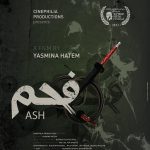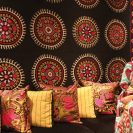Filmmakers from the Middle East share the common struggle of finding a channel that gives them a viable opportunity to properly portray their vision, and turn their scripts into real projects. We can blame this inability on a myriad of factors, such as economic and political turmoil in the region, social constraints, and fear of persecution, amongst many more. With Cinephilia Productions, however, we learn that when there is a will, there is a structured path toward turning a filmmaker’s dream into a reality. Cinephilia Productions’ Founder, Darine Hotait, knows this struggle all too well.
After then 11-year-old Darine’s family left their civil war-ridden hometown of Beirut to the US, she discovered her love for writing, and began fervently writing her diaries and poetry at her grandmother’s home in Detroit. She wrote of loss, adaptation, and defining family. From there, Darine grew up to complete her MFA in screenwriting and film directing at the Art Center College of Design in Pasadena, California. Her work revolved around writing and directing a number of award-winning films at International film festivals. She gained recognition as an ‘EMMY Award Finalist’, ‘Best Short Film at Evolution Film Festival, ‘Audience Award’ at Zero Film Festival, Nominated for ‘Best Foreign Film’ at International Filmmaker Festival, and ‘Honorable Mention’ at the Los Angeles International Film Festival, amongst many others. Her work was published in the Journal of Short Film, an Ohio State University DVD publication. Darine also wrote her debut science fiction feature film Symphony of a Flood that made it to the top finalist list at the Hearst Screenwriting Competition and the Sundance Sloan Award, and is currently in its financing stages.
This creative’s passion for production, screenwriting and directing, led her to found Cinephilia Productions. She is also an avid science fiction fan, and aside from her role at Cinephilia Productions, Darine is also a published playwright, short story writer and poet, and is currently in the process of writing her science fiction short stories collection I Come From Future. Just in time for her upcoming appearance at the Nuqat Creative Conference, bazaar speaks to Darine about Cinephilia Productions, and what she aims to accomplish in the future.
What experience(s) triggered your desire to found Cinephilia Productions?
Cinephilia was founded in Los Angeles in 2009 then it was moved to NYC in 2011. Initially it started as a production house to produce narrative films in the US. Now the question is, what made me want to go on with Cinephilia? After a tour that I did in the Middle East in 2010, and after connecting with filmmakers there, I knew that Cinephilia could be much more than a production house. I felt it was very much needed in the region. So I decided to focus Cinephilia on the Middle East and Africa and to create initiatives to educate filmmakers, discover new voices and produce content from the region. Cinephilia aims to be dedicated to filmmaking as a distinctive independent art form.
What does Cinephilia want to accomplish, and how does it help filmmakers?
Cinephilia aims to be a platform that can provide unconditional freedom for filmmakers to address absolute restricted issues and be employed in their own imagination. As well as to work on developing storytelling potential, criticism faculty and technical proficiency and above all, to promote content originality and high standards of storytelling sensibility. At Cinephilia, we want to help filmmakers by employing a threefold strategy; first of all to develop their content through our lab initiatives, second of all to have the opportunity to produce this content through our resources, and third, to create a window for collaboration.
What are the types of projects that attract Cinephilia Productions?
Cinephilia Productions is looking for unique, ‘outside the box’ projects. We love science fiction as much as we love auteur films. What matters is the filmmaker. We are interested in the filmmaker as an individual. We are looking to work with filmmakers who are committed to their vision, have a clear voice and apply a good deal of maturity to their work. We want to tell stories that matter from the point of view of filmmakers who really have something new to say and can say it using an authentic language.
Can you tell us about the “Filmmakers to Watch” platform?
Launched in 2013, the Cinephilia Filmmakers to Watch (FTW) series is a yearly curated screening series that includes between 5-8 short films from the Middle East, North Africa and South Asia. It highlights the work of unique and remarkable voices from the region. It is a platform to promote upcoming talents. During the past 2 editions the series included award-winning films from Afghanistan, Turkey, Lebanon, India, the UAE and more. The program screened in Alexandria, Cairo, Tunis, Dubai, and Abu Dhabi. The Cinephilia FTW screens in art houses independent theaters, art galleries and non-profit screening spaces. Screenings are followed by a panel discussion (Q&A) and a networking event where local filmmakers and industry professionals gather to discuss the current of the art form. We open submissions yearly from January 1st until the end of February and we expect filmmakers to fit the eligibility requirements that can be found on our website.
Can you tell us more about Cinephilia’s initiatives in the Middle East?
Cinephilia has launched three lab initiatives in the Middle East and Africa with a major focus on screenwriting. All our labs are highly selective and only accept up to 6 filmmakers.
The Cinephilia Screenwriting Lab for Shorts is an intensive one-week lab where filmmakers develop their short film screenplays. This lab offers the Best Screenplay Award to one filmmaker who shows dedication to the art form, sincerity to their personal vision and novelty in their voice. The screenplay gets financed and produced by Cinephilia. In 2013 we had 4 winners, of which one film titled ASH by Yasmina Hatem (Lebanon) premiered at the Montreal World Film Festival. AMAL by Yasmine Ghorayeb (Lebanon) is filming this November in Beirut. MAUDE by Jason Joseph (UAE) is in pre-production in Dubai. INTERLUDE by Salma Ibrahim (Egypt) is in development. This lab also often invites acclaimed filmmakers as guests to discuss their career and give advice to filmmakers.
The Cinephilia Screenwriting Lab for Feature is a three month long lab where filmmakers develop their first or second feature film screenplay with the help of a script doctor. This lab offers filmmakers the tools to get their screenplay in shape and to get their film properly packaged for financing.
The Cinephilia Directing Lab is a one-week intensive lab that focuses on the director’s work with actors and the importance of the director’s vision.
Our screenwriting labs have toured in over 10 cities developing over 120 screenplays.
By the end of this year, we are launching a journal that will feature filmmakers in a unique way, and a production lab is also in the works.
What about your latest project that is currently in development, ORB. Can you tell us more about that?
ORB is a science fiction film with a story that takes place in Beirut in the near future. It’s the story of a mother who lost her child in an accident but she is given the chance to bring him back to life and make him immortal. The film questions our understanding of the repulsion between mortality and immortality, these 2 poles of extremities that govern our nature.
The science fiction genre is almost non-existent in the Middle Eastern/Arabic speaking cinema. Since our cultures are immersed with the present and the past, it is hard to see the future that seems at a loss. I decided to create ORB to propose a vision of the near future. Also ORB serves as a showcase of ideas from my debut science fiction feature film that’s now in the financing stage. Hopefully ORB will boost the chances of attracting possible investors.
ORB is being produced by renowned Lebanese producer Sabine Sidawi Hamdan from Orjouane productions and co-produced with Cinephilia. The film will be shot in Beirut and New York City in January 2015 with the fabulous actress Cherien Dabis (May in the Summer, Villa Touma) playing the role of the mother. The film is scheduled to release in May 2015. ORB will use a great amount of visual effects and innovative robotics that will be done by a highly acclaimed company in New York and I am very excited to implement this experience in an Arabic speaking film.
In your opinion, what is the greatest challenge faced by filmmakers based in the Middle East?
Definitely not inspiration. There are lots of stories to be told from the Middle East. I think there are great challenges that come in a sequential order. First, a majority of filmmakers are not showing enough commitment to the art form, therefore there is a lack of maturity in the films that are being made. Second, those committed are not finding resources where they can develop their projects with the assistance of consultants, so we often get underdeveloped screenplays. Third, with a committed filmmaker and a well-developed project there is still a huge fracture in the financing stage, therefore projects take so long to be made or never get made. I must add, however, that this is slowly changing in the region.
You will be giving a lecture and a workshop at the upcoming Nuqat conference. What should attendees expect, and what will they benefit from the experience?
My lecture is titled ‘The Film Smart Mobs and the Global Brain’. This year’s conference focuses on the collective approach. I call filmmakers Smart Mobs as they have to think, act and move collectively to form a global brain that can achieve symmetry in the synthesis of individual ideas and collective actions. This global brain functions only under a collective intelligence that is equally and dynamically distributed between its modules and their interactions. This is film from data to product.
As for my workshop, it’s a 4-day screenwriting workshop from November 16 -19, 2pm-6pm. This workshop offers the tools that result in a strong narrative short film screenplay while focusing on the individual’s unique voice as a writer and by connecting like-minded people through shared collective feedback. The participants will be guided through a set of exercises to develop a simple one-line idea to a fully developed screenplay. The workshop covers various aspects of screenwriting: character and plot development, thematic to visual storytelling. It will also highlight the business aspect of screenwriting from pitching to development funding.
The workshop will only allow up to 15 participants. People can register by referring to the Nuqat website.
For more information, please visit their website www.cinephiliaproductions.com , and sign up for Darine’s workshop at www.nuqat.me.
Photo of Darine by Nora Schaefer.












